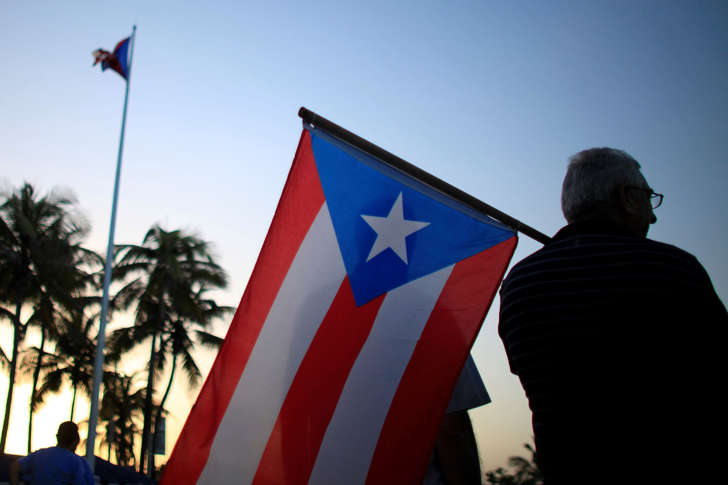Prices on the commonwealth's debt, even the general obligation bonds that are the most secure form of government debt, dropped sharply after Gov. Alejandro Garcia Padilla's weekend statement about the commonwealth's financial problems. Citing a report by Anne Krueger, the inaugural managing director of the International Monetary Fund, the governor called on both residents and bondholders to make concessions that would rejuvenate Puerto Rico's economy.
The commonwealth's debt is so high that raising taxes and cutting spending wouldn't fix anything, he said: If Puerto Rico continues to borrow, its debt will double to $140 billion in just 10 years, or more than $40,000 for each man, woman and child.
What the governor proposes instead is restructuring its debt to postpone payments "for a number of years" so the money can be invested in Puerto Rico. "It is time that those who lent to us also come to the table of sacrifices, at which we are already seated, so that later we can all together share the fruits of that sacrifice," Padilla said.
It's a plan greeted that investors have greeted with anger and dismay. Among the debt now at risk is a popular $3.5 billion series of general obligation bonds issued last year that would pay an annual 8% coupon rate, with a maturity in 2035.
That bond's tax-free yields, coupled with a high interest rate, prompted large purchases by hedge funds and firms specializing in distressed debt, who snapped up about 70% of bonds. Retail investors and funds including Oppenheimer and Franklin Templeton also took large pieces, Villaluz said.
 © AP Photo/Ricardo Arduengo
© AP Photo/Ricardo Arduengo Prices on the bond dropped 11% this week to 69 cents on the dollar, but the selloff might have been even worse if investors were aware of the stake held in regular mutual funds. Already the bond has fallen 21% this year.
Franklin Templeton officials are analyzing the policy recommendations of a Krueger's report, titled Puerto Rico - A Way Forward and "waiting to hear more from the governor on next steps," said Stacey Coleman, a spokeswoman.
OppenheimerFunds has offered Puerto Rico "numerous creative and viable solutions" Ray Pellecchia, a spokesman, said in an email.
"We strongly believe the commonwealth has the ability to provide essential services to its citizens, grow the economy and repay what bondholders are due," he said. "We are disheartened that Governor Padilla, in a public forum, has called for negotiations with other creditors, representing and including the millions of individual Americans that hold Puerto Rico municipal bonds."
The Puerto Rican government guaranteed its general obligation bonds by the constitution of the government, placing their priority above pensions and all other obligations that the unions are fighting against, said Arturo Porzecanski, an economist at American University.
"Most bonds spell out what would happen if the obligator doesn't have the money to pay," he said in a phone interview with TheStreet. "In the case of [general obligation] bonds, they say they are backed by tax revenues, so any revenues that comes in, payments must be prioritized first. I don't want to say they are restructuring proof, but they get higher priority than firefighters, or policemen or teacher pensions."
Porzecanski took a stake in Puerto Rican bonds after a three-decade career in Wall Street, believing he was acting as a conservative investor by diversifying his portfolio. But when he heard Padilla saying that priorities needed to be adjusted across the board he knew there would be a sharp decline in value.
"He didn't mention anything about protecting the GOs, he just talked about shared burdens," Porzecanski said.
"I don't know about other retail investors, but I'm genuinely concerned," he said. "Many investors want municipal bonds to diversify retirement accounts. And there's not a problem in the municipal bond market, there's a problem with this particular issuer."
Powerful union sway, mass emigration, and stagnant growth have been central challenges to Puerto Rico's economy, he said. The school-age population has shrunk 40% over the past 10 years, while school staff has increased 10%.
"What the Puerto Rican government would like is a structure that doesn't put bondholders in first place," he said. "They want to structure my bonds so the creditors take a hit, so they don't have to raise rates, cut pensions, or lay off phantom employees."
Some investors were quick to ditch Puerto Rican bonds when the island said it couldn't meet its credit obligations, but many others don't even realize some of the commonwealth's $72 billion in debt is lurking in their portfolios.
Why a Puerto Rico default is more dangerous than you think
No comments:
Post a Comment